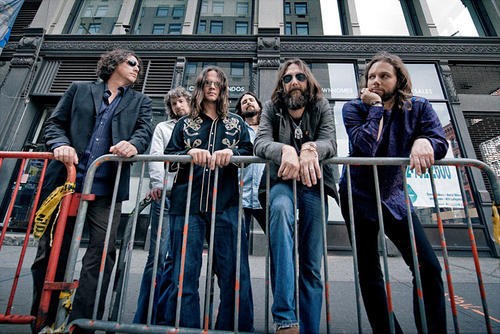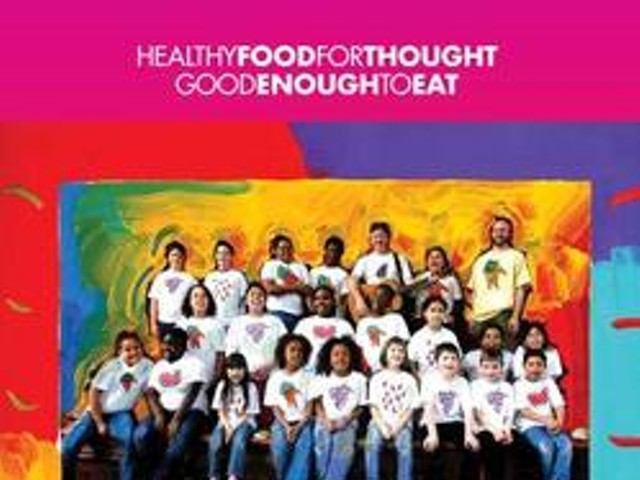The Black Crowes is playing at the Pageant tomorrow night as part of its "Say Goodnight to the Bad Guys" tour. (Remember, don't bring a camera.) Drummer Steve Gorman chatted with the RFT this week; read on below for outtakes, including a touching recollection of working with Warren Zevon on his final album.
RFT: The Black Crowes came along at an interesting time. Did the subsequent onset of grunge make things difficult for your band? Steve Gorman: No, it didn't. We never saw grunge as anything other than [something] that will be over in a couple of years. Since we didn't come from the L.A. metal scene or the grunge scene, we were in between the two [and] some guy I remember said there was Guns 'n Roses on one side of this river and then you guys are this bridge over to Nirvanaland, and I was like, "That's the dumbest thing I've ever heard." And then the more I thought about it, I was like, Well okay, I guess that works as an analogy as far as big American bands to make a stamp. But those bands were associated with a scene, and we never were.
When Nirvana really blew up and then Pearl Jam blew up the next summer we were on our second record and our tour was going exactly as we had expected it to be. We didn't want to do outdoor amphitheaters, we wanted to do multiple nights in theaters. We were definitely going for more of a vibe - we wanted to be in front of 4,000 people, not 11,000 people, so we'd play three nights instead. We just felt more in control. That was a way to manage the thing that had exploded around us. We were always more focused on what we were doing live, [so] our touring for the second album did great. We spent the summer of late '93 headlining European festivals, so we didn't feel like grunge hurt us on any level; we were doing very well. By the time our third record came out, it wasn't so much grunge; radio had changed.
Rock radio had really shifted to what they're now calling alternative radio, which basically just meant it had to be anything that came out from Nevermind forward, and we were suddenly considered old. I remember one time a program director saying "you guys are just too old of a band," and Rich [Robinson] was 23, and I was like "Huh, that's interesting." So it wasn't necessarily grunge, but just shifts in the industry. But then again, look how many shifts there have been since then - that was just the first one that happened while we were riding high. Every two years there's a whole different template for what works or what people think is it. We've luckily avoided every one of those. Some of them have hurt us and some of them have helped us and we try not to pay attention to either one really. Because it will just drive you crazy - about 96 percent of what happens is totally out of your hands, so we just really focus on what we're doing. On Ringo Starr and how Ringo influenced his playing as a drummer: RFT: I know that Ringo Starr is a big influence on you as a drummer, which I find interesting because while he is revered by many, he hasn't always been labeled critically as a great drummer. So I'm curious to know how he influenced you as a player.
People still argue about [basketball players] Bill Russell and Wilt Chamberlain, you know what I mean? And if that's an argument you're going to actively [pursue] - anyone who says Wilt Chamberlain, I don't even listen to them. I don't want to know anything else about their life. It's like saying Ringo or Neil Peart - that doesn't even make sense to me. Of course Neil Peart is an amazing drummer, as is John Bonham, as is Charlie Watts, as is Glenn Kotche from Wilco - that guy is insane! I would honestly say even more so than Bonham and Led Zeppelin, I can't imagine another drummer playing in The Beatles. The sound and feel of that band, people just take them for granted as far as how great of a band they were, because they're the biggest band ever.
You go back and listen to their live tapes from '62 and '63, when they're just playing six hours a night, they are swinging like crazy! Ringo is such a swinging drummer and he's very much a groove drummer. Everyone talks about Ringo because he's the most famous drummer ever and they miss the point on him. The other guy that no one ever talks about is John Densmore from the Doors, who's just a monster part of what the Doors were. The Ringo thing, you just can't hear anybody else playing those tunes. You just can't imagine any of that stuff making more sense. I hear "The Ballad of John and Yoko" and it just makes my skin crawl to hear Paul McCartney play that drum kit the way he plays it. It's hard for me to even know where to start because there's hardly been anybody more musically in tune with what the song needed than Ringo Starr. Who knows how it must have been like to be in the Beatles, but the fact is he was the one in The Beatles. You look at the scoreboard and they won the game, you know what I mean? Definitely. You hear certain drummers, and you know by the sound of their playing, exactly who it is behind the kit. Totally. The best example is on the "Sgt. Pepper" reprise at the end of the album, when it counts in and he just plays that little beat for eight measures, that is my favorite drum pass of all time. I can listen to that on a loop for an hour. It just feels perfect to me - that's what everything is supposed to feel like, right there. And every drummer in the world can play it, but nobody can make it feel like that. Drumming is about something feels.
On working with Warren Zevon: You got to do some work with Warren Zevon on his final album [The Wind], how did that come about? I played on one track, "Knocking On Heaven's Door." It came about because I was actually working in the studio with Billy Bob Thornton. He has a studio in his house - he bought a house from Slash, so it had been Slash's studio - it's a very nice place. We had a couple of mutual friends and I had met him [Billy Bob] a few times and one day he goes "Hey, would you ever think of playing on something?" And I said "Yeah, of course, whatever." I lived in L.A. at the time, so I went over one night and I think that three or four nights in a row, we just got together and knocked out some tracks.
On the last night that I was there, we had finished and it was about midnight. I was already going around making sure I had my keys and it was like "I'm out of here." And then the door opened to the studio and Warren walked in. I was instantly like, "Okay, I'm not going anywhere," having been a huge fan for years. This was about two months after he had announced publicly that he was terminally ill. So I had a complete moment of elation followed by, "Ooooh fuck." It was really bittersweet to meet him at that moment. You just can't help thinking "holy shit, this guy is dying." And if you didn't know, you would have, because his whole trip was gallows humor. He was just going to mock himself to the end and he did not want anybody to be uncomfortable. It was like, "No man, fucking make a joke, don't be sad, fuck it - I've had a great fucking life." So there was a lot of laughs and a lot of sitting around.
Footage of the recording session for "Knockin' on Heaven's Door" at Billy Bob Thornton's studio:
The whole song came about because he said "Yeah, I saw Dylan last night - man, I must be dying because he played four of my songs" [laughs]. He goes, "The first one I thought, Well that's nice. The second one I thought, Wow that's great and then the third one, I was like holy shit I'm really dying." So it was that kind of a vibe from him. And he's like "They had to tell me what song it was - you can't tell what the fuck he's playing, but hey, great guy - it was nice of him to throw a bone to me like that." It was all in good fun, but he said, "You know I was thinking I should probably do a Dylan tune for my last record." Warren's bass player Jorge Calderon was on the session and he was already there - he goes "oh, well what about Knockin' On Heaven's Door?" He said it [and was] sort of joking but not really and just was waiting to see how it was going to go - everything has been kind of tongue in cheek up to that point. And Warren goes "Well no, that was exactly what I was thinking - when am I ever going to sing that song and have it be better than right now?"
Everybody, without a word, stood up and just walked into the tracking room. We were like okay, well we're here. Because he was already in the process of making this record with other guys - he had put a band together. So he went into the vocal booth and everyone picked up their guitars and I sat down and it was like "Everyone knows the change, right?" It's just two parts and we said "alright, start on acoustic and then it will kick in, let's do verse/chorus/verse/chorus/solo/out on the chorus." And everybody went "okay" - we did it once, and that's what is on the record - that was it. He sang it live and when he first came in and sang that first line, it was in my headphones. I could see into the vocal booth, and he was really laboring to get his breath. He was sitting down but he would stand up and sing and then when there was the guitar solo, he sat back down and he was winded doing it. It was incredible - there's no way to describe it. It doesn't cheapen it and it doesn't do it justice but it was easily the most emotional and incredible night that I've ever spent in the studio.






